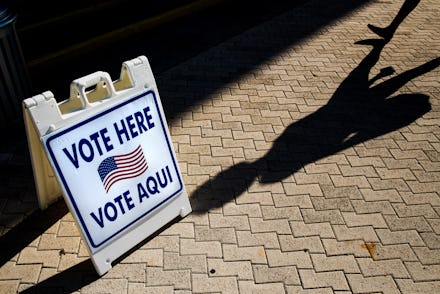How to tell if it's safe for you to vote in person this November

The stakes of voting this year feel cosmic. For queer radical leftists like me, it seems like if we don’t cleanse the White House of a certain element, we will soon be living in a police state on a dying planet. But some of us also have health concerns that make voting in person risky, so how do we figure out whether it’s safe for us to vote at the polls? I asked Mehmet Oz — a.k.a Dr. Oz, host of The Dr. Oz Show — to explain what we should keep in mind when considering how to vote in November.
“Everyone’s vote is vital, and most people can vote in person safely,” says Oz, who is also an NYC-based cardiologist and professor of surgery at Columbia University. As long as you take the same kind of precautions that you would take when you go to the grocery store — wear a mask, wash your hands, bring hand sanitizer, and stay at least six feet apart — anyone who doesn’t have underlying health conditions should be okay, he tells Mic.
As we know by now, there are certain health conditions that make afflicted people more vulnerable to falling prey to coronavirus. “Many of the most common chronic diseases — including heart disease, type 2 diabetes, obesity, chronic lung conditions such as COPD, kidney disease, cancer, and autoimmune disorders — put a person at much higher risk for severe and potentially fatal COVID-19 infection,” Oz says. He warns that if you fall into any of these categories then it’s important to weigh the risks of visiting a polling site in person.
To be clear, he is not saying that people with those risk factors shouldn’t vote at the polls, but they may need to take additional precautions. If you have concerns about your individual circumstances, Oz says you should talk to your doctor about how to vote safely. We’d love to elaborate on the precautions here, but it wouldn’t be responsible, since each condition — and each person who is managing it — warrants personalized medical advice.
Oz also notes that, besides individual health concerns, other demographic factors contribute to how likely you are to contract coronavirus. “The elderly, pregnant women, people with disabilities and substance abuse disorders are much more vulnerable,” Oz says. “Social inequalities also play a role in risk. Systemic racism has put racial and ethnic minority communities at higher risk.” Unfortunately, what it does mean is that if you are part of a marginalized community, you have to be more vigilant about your precautions than rich white people with health insurance and #firstworldproblems.
In case you aren’t already doom scrolling, you also need to check the COVID-19 rates in your area. Check with your local health department for information on case counts, new hot spots and testing positivity rates. That will ensure that you have the most accurate, localized stats to consider.
Oz urges everyone to remember that even if the COVID-19 positivity rate in your community is low, you still need to take precautions. This pandemic isn’t over, and the only way we’re going to get through it is to stay vigilant.
By the way if you feel sick, you should stay home. This means “symptoms such as a fever greater than 100.4, chills, cough, shortness of breath, body aches,” Oz says. He also notes that if you have tested positive or come in contact with someone who has tested positive for COVID-19 within the past 14 days, know that you could be spreading the virus. This is why early voting is crucial. In most places, it starts weeks before November 3rd. So, if you plan to vote early and you get sick, chances are good that you will be well in time for D-Day.